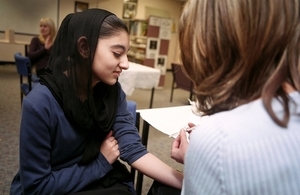Measles cases remain high as MMR campaign makes progress
Cases of measles in England are at highest recorded levels since 1994, with 1,168 confirmed cases this year (Jan-May 2013).

MMR vaccination
Cases of measles in England are currently at their highest recorded levels since 1994, with the total number of confirmed measles cases so far in 2013 (January to May) at 1,168, compared to 712 for the same period in 2012.
Cases declined in May with 188 confirmed cases compared to 299 for April, suggesting that the MMR catch-up programme may be having an impact, but it’s too soon to be sure. 10 to 14 year olds continue to be the age group most affected.
Preliminary figures released today by Public Health England (PHE) estimate that around 56,000 previously unvaccinated 10 to 16 year olds in England have received a first dose of vaccine in the catch-up programme and around the same number of partially vaccinated children have also received an extra dose of MMR.
PHE estimates that around 120,000 extra 10 to 16 year olds need to have their first MMR doses to reach 95% uptake of the first dose – these are the ‘priority’ group who do not have any protection against measles, mumps or rubella. The 56,000 who have so far received a first dose suggests we are almost halfway toward this aim.
A detailed study on exactly who was unvaccinated, who has had one dose and who has had two doses is underway and is expected to be completed in the autumn.
Ninety-five per cent of GP practices have ordered extra vaccine and more than 200,000 extra doses of MMR vaccine have been delivered. To ensure as many children are vaccinated as possible, the need for a school based programme is being actively considered for the next academic year.
Dr Mary Ramsay, Head of Immunisation at Public Health England said: “Measles is a highly infectious and unpleasant disease that can lead to very serious complications. Children who have not had the MMR vaccine are at high risk of catching the disease.
Thanks to the hard work of local health teams we are making good progress towards the 95% target, but there still remains a large number of 10 to 16 year olds, together with many younger children and adults who are under-vaccinated. The programme will continue until we reach as many children as possible in the age groups most affected.
If your child has not had the MMR vaccine, the upcoming summer holidays is a good time to contact your GP to get them vaccinated.
Professor David Salisbury, Director of Immunisation at the Department of Health, said:
The best way to beat measles is to protect people before measles catches them. It’s encouraging that GPs have taken up the challenge wholeheartedly but we now need to make sure that all children at risk are vaccinated.
The best thing that parents can do, if their children have not had two doses of MMR, is to make an appointment with the GP now.
ends
Notes to editors:
-
Provisional data from ImmForm suggests a fall in the unvaccinated population since the catch-up programme of 1.3% – consistent with around 56,000 doses – almost halfway toward the 120,000 aim. ImmForm data is collected from 1,276 GP practices (around 16%).
-
The total target population of unvaccinated 10 to 16 year olds is around 300,000. The catch-up programme has a wider ambition to reach partially vaccinated 10 to 16 year olds (around 300,000) and unvaccinated and partially vaccinated children outside this age group (around 300,000).
-
A total of 188 cases of measles were confirmed in England with onset in May 2013, making a total of 1,168 cases since the start of the year. The region most affected is the North West although numbers continued to be high in the north east and cases in London have increased. The age group most affected in May was age 10 to 14 years (52/188, 28%).
-
Among cases this year, 231 (20%) were associated with secondary school outbreaks. Small outbreaks have also been reported from “hard-to-reach” populations with known low coverage such as the travelling community and the ultra-Orthodox Jewish community in north London.
-
Overall 230 (20%) of all cases in 2013 were admitted to hospital including 35 with complications including pneumonia, meningitis and gastroenteritis.
-
A table of confirmed cases of Measles, Mumps and Rubella 1996 to 2012 is available. The present system of testing suspected cases began in 1994.
-
Public Health England is a new executive agency of the Department of Health that took up its full responsibilities on 1 April 2013. PHE works with national and local government, industry and the NHS to protect and improve the nation’s health and support healthier choices and will be addressing inequalities by focusing on removing barriers to good health. To find out more visit our website www.gov.uk/phe, follow us on Twitter @PHE_uk.
UKHSA press office: National Infection Service
UKHSA press office, infectious diseases
61 Colindale Avenue
London
NW9 5EQ